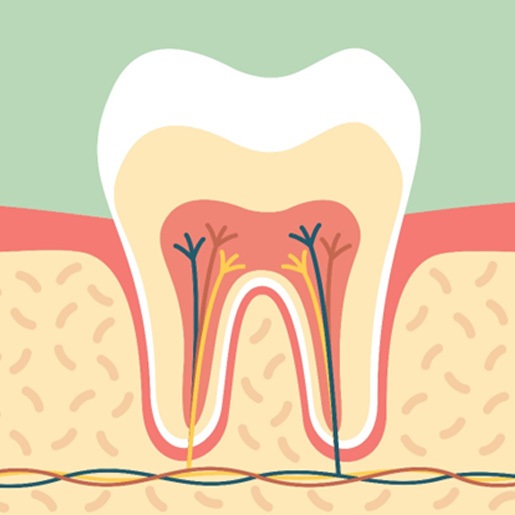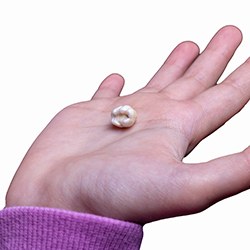Nerve Treatment – Willow Park, TX
Saving Growing Smiles by Stopping Bacteria
Is your child suffering from an intense toothache? When bacteria and decay have spread to the inner layer of the tooth (the pulp), it can cause significant discomfort and inflammation. Fortunately, our team at Stroud Pediatric Dentistry is ready to help. We offer nerve treatments to help restore and save your little one’s smile before it’s too late. If you’d like to learn more about this service or want to make an appointment for your child, give our office a call today!
Why Choose Stroud Pediatric Dentistry for Nerve Treatment?
- Effective Treatment Option to Save Baby Teeth
- Calming Dental Sedation Available
- Gentle and Safe Approach Used by Team
What Is Pulp?

The pulp is located in the center portion of every tooth and is comprised of nerves, tissue, and blood vessels. If decay and infection reach the area, it can cause serious pain and discomfort for your child. Even though adults are just as vulnerable to decay, it’s still more common in children because of their lack of diligence in practicing good oral care habits. Since kids have a more active nature as well, they’re more likely to experience dental injuries, which can affect the pulp of a tooth.
What Are Signs of Bad Pulp?

Even though pulp cannot be seen, you or your child will know fairly quickly if damage has occurred. If you notice any of the following signs, call our office right away and schedule an appointment:
- Constant unexplainable pain
- Nighttime pain
- Sensitivity to foods and drinks at extreme temperatures
- Unexpected tooth loosening
- Swelling around the affected tooth
- Redness developing on or around the gingiva near the problem area
How Is It Treated?

First and foremost, your child will undergo a thorough oral examination at our office. We’ll confirm whether or not there’s infection or damage to the pulp area of the tooth. Using our findings, we’ll create a custom treatment plan and explain each step to you and your child in preparation for the procedure.
Before nerve treatment begins, we’ll numb the area with a local anesthetic to ensure your child is completely comfortable. If needed, sedation dentistry may also be used. We’ll carefully remove the infected pulp tissue, medicate the nerve to calm it, and stop bacterial growth.
A temporary crown will be placed over the weakened tooth to protect it while your final restoration is made. After a few weeks, your child will return to the office and have their permanent crown secured into place.
Understanding the Cost of Nerve Treatment

The cost of nerve treatment for kids depends on a few factors. When your child attends their consultation, we will learn about the details of the situation and then provide you with a tailored cost estimate. You can view this service as an investment in your child’s long-term oral health.
Factors That Can Affect Nerve Treatment Cost

Some factors that may have a bearing on the cost of nerve treatment include:
- The specific tooth that requires treatment. Back teeth (molars and premolars) may be more challenging to treat than front teeth, which can lead to higher overall fees.
- Overall difficulty of the case. If there are factors that make your child’s case more complex than usual, it could lead to a slight increase in price.
- Additional services. In most instances, it is necessary to place a crown after nerve treatment. The crown has a separate fee.
Is It Cheaper to Pull My Child’s Tooth?

Generally speaking, the upfront cost of a tooth extraction is less than that of nerve treatment. However, we encourage you to think, not just about short-term costs, but also about long-term value. Prematurely extracting a baby tooth could interfere with the development of incoming adult teeth, while extracting a permanent tooth can also cause complications, including dental drift and a misaligned bite. While such issues are treatable vis tooth replacement or other means, they can cost a fair amount of money to address.
Nerve treatment, on the other hand, can preserve your child’s tooth and allow it to continue functioning. This can boost their self-esteem, prevent dental health complications, and lead to lower long-term costs.
Does Dental Insurance Cover Nerve Treatment?

Very often, yes, dental insurance does cover nerve treatment. Usually, it is classified as a major procedure, so around 50% of its cost might be covered, up to the amount of your child’s annual maximum. Our team is in-network with Delta Dental, and we welcome other PPO plans. We will be happy to help you understand how you can use your family’s benefits for your child’s unique situation.
We do not want you to be overly stressed about paying for your child’s nerve treatment! Talk to our friendly Willow Park pediatric dentistry team to learn more about your financial options.
Nerve Treatment FAQs
Is Nerve Treatment the Same Thing as a Pulpotomy or Pulpectomy?
When we talk about nerve treatment in Willow Park, we are referring to procedures that address problems within the tooth’s nerve tissue, commonly known as the pulp. This may mean that we are discussing a pulpotomy or pulpectomy.
A pulpotomy removes only the damaged portion of the pulp from the crown of the tooth, leaving the healthy root pulp intact. A pulpectomy is more extensive, as it involves removing all pulp tissue from both the crown and the roots of the tooth.
While both procedures are types of nerve treatment, the specific approach needed depends on the severity of the infection or injury. At our pediatric dental practice, we will carefully assess your child’s needs to determine which procedure will best preserve the tooth and maintain their oral health.
What Is the Recovery Like after Nerve Treatment?
After your child receives nerve treatment, you can expect a relatively smooth recovery process. Your child may experience mild discomfort or sensitivity in the treated area for a few days. We recommend that you give your child soft foods and avoid anything too hot, cold, or crunchy. Over-the-counter pain relief can help manage any soreness, but if discomfort persists for longer than a week or so, you should call our office.
We monitor our patients closely and encourage open communication so our patients have the best chance of healing as planned. We will provide detailed aftercare instructions for your child, and we are always available to address your concerns or answer any questions during the recovery period.
Is Nerve Treatment Only for Baby Teeth, or Can It Be Used on Permanent Teeth?
Nerve treatment is not limited to baby teeth; it is also a valuable option for saving permanent teeth. If your child’s permanent tooth has been affected by trauma or decay, nerve treatment can help preserve the tooth’s structure and prevent the need for extraction.
Our pediatric dental practice evaluates each case individually and recommends nerve treatment when it is the best choice for long-term oral health. By treating both baby and permanent teeth, we help your child maintain proper chewing function, alignment, and a healthy smile. We believe in proactive care and will guide you through the options available, so you can feel confident about your child’s dental treatment plan.
How Should My Child Take Care of Their Treated Tooth?
Proper care after nerve treatment is essential for a successful outcome. You should encourage your child to brush and floss gently around the treated tooth, using a soft-bristled toothbrush to avoid irritation. Our practice advises avoiding sticky, hard, or chewy foods that could damage the restored area or harm the crown that is placed on the treated tooth. (Temporary crowns are particularly vulnerable; fewer precautions are needed for permanent crowns.)
Regular dental checkups allow us to monitor the healing process and help the tooth remain healthy for the long-term. We believe in educating families about oral hygiene habits that support recovery and prevent future issues.
If you notice swelling, persistent pain, or any changes in the treated tooth, we urge you to contact us promptly.
